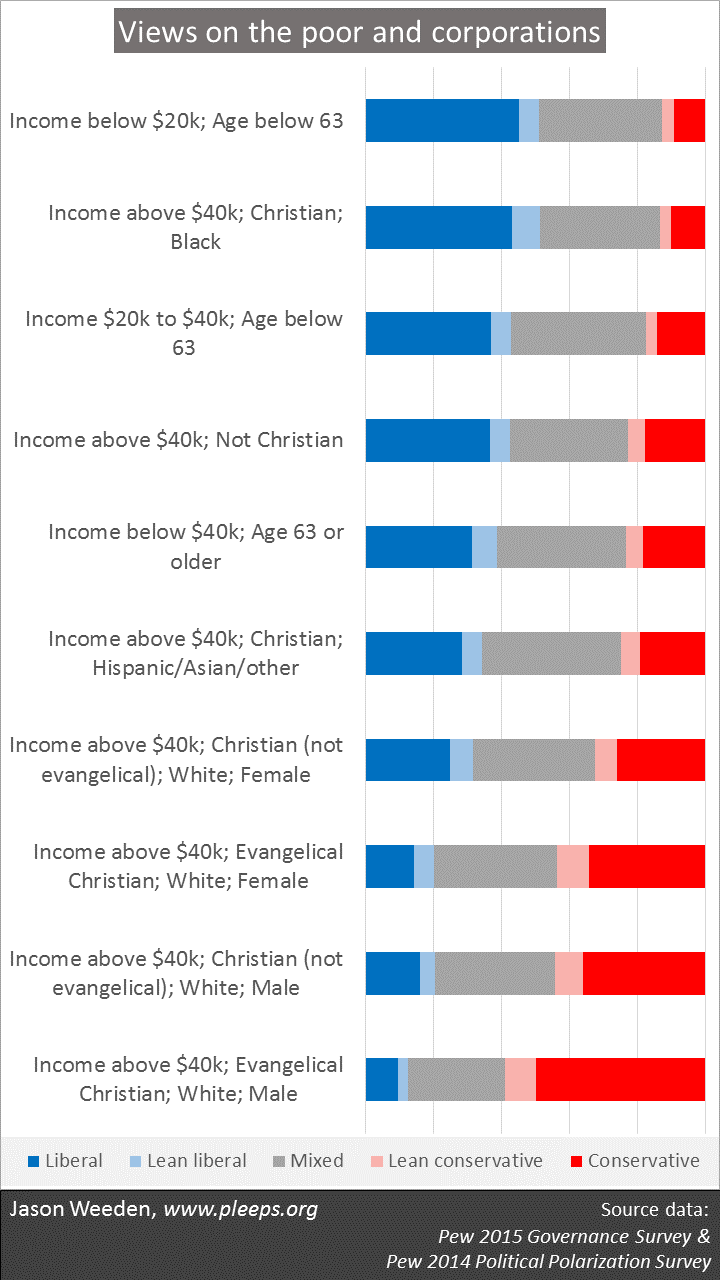Bernie Sanders tells his supporters that wealthy corporations must pay their fair share. Orrin Hatch tells the U.S. Chamber of Commerce that Obama’s agenda is class warfare. Where does the public land? The answer has a lot to do with income, age, religion, race, and gender.
Here, I look at two items from the Pew political surveys. One asks for a choice between two statements on government benefits and the poor: (1) Poor people have hard lives because government benefits don’t go far enough to help them live decently; (2) Poor people today have it easy because they can get government benefits without doing anything in return. The other asks for a choice between two statements on corporations: (1) Business corporations make too much profit; (2) Most corporations make a fair and reasonable amount of profit.
I combined the answers to the two questions are went looking for the big differences in group positions based on demographics. The first big split was, perhaps unsurprisingly, on income—people with below $40,000 in annual income are substantially more liberal on average than people with higher incomes. Then I took those two groups, found the next-biggest splits, and kept going with the biggest splits in the biggest sub-groups until I ended up with the 10 below—shown from most liberal to most conservative.
 (Technical notes: The total sample size is 16,017. Responses are weighted. “Liberal” means people who selected the liberal response on both items (and the reverse for “conservative”), the “mixed” folks went one way on one and the other on the other (or had no opinion on either), and the “leans” are smaller categories where people answered one item but were neutral on the other. “Evangelical” means “born again or evangelical” or Mormon. “White” is non-Hispanic white.)
(Technical notes: The total sample size is 16,017. Responses are weighted. “Liberal” means people who selected the liberal response on both items (and the reverse for “conservative”), the “mixed” folks went one way on one and the other on the other (or had no opinion on either), and the “leans” are smaller categories where people answered one item but were neutral on the other. “Evangelical” means “born again or evangelical” or Mormon. “White” is non-Hispanic white.)
As I said, the initial split was income over/under $40,000. There are a lot more liberals than conservatives in the under-$40k camp, particularly for those under $20k. But the numbers are closer when they’re seniors. The not-as-liberalness of lower-income seniors comes, I suspect, from two sources. First, knowing that someone’s annual income isn’t very high just isn’t as meaningful information when you’re getting it mostly from retired people. And second, seniors have their own—rather generous (relative to other U.S. government programs)—set of support programs (primarily Social Security, Supplemental Security Income, and Medicare), programs that are in budgetary competition with programs for the non-elderly poor. (Given their Sanders skew, one might have expected to find young people as especially liberal on these rich-poor items. But, as I’ve discussed, it’s just not the case that Millennials are particularly liberal on these kinds of economic items.)
Among those with incomes above $40,000, the big splits involve religion, race, and gender. Blacks and non-Christians are basically as liberal as the under-$40k folks. Hispanic/Asian/other Christians and non-evangelical white women are more evenly split. Evangelical white women and non-evangelical white men are pretty conservative on the whole. And the group in which conservatives most greatly outnumber liberals (by over 4 to 1) is evangelical white men.
As I’ve discussed elsewhere, there are various practical matters that help make sense of these opinion patterns. Some aspects involve short-term self-interest (e.g., why the non-senior poor tend to favor assistance to the non-senior poor). Some aspects relate to who has higher likelihoods of needing hard-times assistance at some point (e.g., race and gender). Some aspects relate to who has better and worse access to non-government support from social networks and charities (e.g., race and religion).
But it’s also clear that there are elements of political coalitioning here as well. Mainly, I don’t see a way to make sense of the remarkable extent of the economic liberalism of wealthier non-Christians without some notion that these are ideological or coalitional sympathies. The irony here is that these are some of the folks who—what’s the matter with Kansas?—are often dismayed that poorer whites are insufficiently supporting their own self-interest. Yet it’s really wealthier non-Christians who tend to be the biggest self-interest outliers on economic issues.
